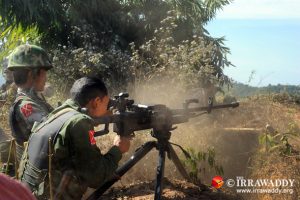Offensives Must Stop to Show Commitment to the 21st Century Panglong Agreement
By Burma Partnership • May 17, 2016 Amid Daw Aung San Suu Kyi’s attempts to speed up the convening of the so-called ‘21st Century Panglong Conference,’ armed conflict, displacement and the lack of humanitarian aid to those suffering only underlines the importance of the peace process. For the sake of trust-building, Burma Partnership calls on the Burma Army to unilaterally halt all military offensives, and for the National League for Democracy (NLD)-led Government to also call on the Burma Army to end military attacks, thus giving ethnic groups an indication of the Government and the Army’s commitment to sustainable peace in the lead-up to a potentially historic event.
Amid Daw Aung San Suu Kyi’s attempts to speed up the convening of the so-called ‘21st Century Panglong Conference,’ armed conflict, displacement and the lack of humanitarian aid to those suffering only underlines the importance of the peace process. For the sake of trust-building, Burma Partnership calls on the Burma Army to unilaterally halt all military offensives, and for the National League for Democracy (NLD)-led Government to also call on the Burma Army to end military attacks, thus giving ethnic groups an indication of the Government and the Army’s commitment to sustainable peace in the lead-up to a potentially historic event.
On 16 May, 2016, according to a statement from the State Counselor, Daw Aung San Suu Kyi, the National Reconciliation and Peace Center will replace the Myanmar Peace Center as a Government Body to coordinate its peace related activities, including the formation of a committee to organize a second Panglong Conference. This follows on from her statement on 27 April, 2016, announcing that this would be convened within two months. Despite the announcement of the new peace center and the second Panglong Conference, the Burma Army is continuing military operations regardless. Clashes between the Shan State Army – North (SSA-N) and the Burma Army broke out with claims by the SSA-N that a helicopter gunship was used. In other parts of northern Shan State, fighting between the Ta’ang National Liberation Army (TNLA), the Shan State Army – South (SSA-S) and the Burma Army continues amid allegations from the TNLA that the Burma Army and the SSA-S – a signatory to the nationwide ceasefire agreement in October 2015 – are coordinating their attacks. Tensions are also high in Hpakant, Kachin State after a series of bombings in the town, as well as an offensive by the Burma Army to take a Kachin Independence Army (KIA) base.
The displaced communities of these armed conflicts remain the ones who bear the brunt of military aggression. For the Kokang refugees who fled to China after an outbreak of conflict in February 2015, they are facing an uncertain and tense future as the authorities in China are pushing them back into Burma, despite their safety and security still in peril in their homeland. For many displaced people, there is also simply not enough humanitarian aid. While some aid is reaching those displaced by the offensives against the TNLA, a recent proposal from an Arakan National Party (ANP) lawmaker in the Union Parliament to discuss the delivery of humanitarian aid to the 2,000 displaced in Arakan State due to the offensives against the Arakan Army (AA) was rejected. Another proposal submitted to Parliament by the ANP to include the AA in the peace process and to urge the Burma Army to end hostilities was merely put on record.
The NLD-led Government needs to do more to provide humanitarian aid to those displaced from armed conflict as the Burma Army continues its offensives. By rejecting the ANP proposals to deliver such aid and to call for an end to hostilities, the wrong message is being conveyed. The NLD must show ethnic communities that it demands an end to the conflict that is causing great suffering. This includes accepting proposals in Parliament requesting such calls, as well as doing more to ensure the delivery of sufficient humanitarian aid, especially since Burma is a signatory to the Geneva Convention. The Burma Army, meanwhile, if it is to show a commitment to the upcoming ‘21st century Panglong Conference’, must halt all military offensives throughout the country. Otherwise it would be impossible for ethnic armed organizations and civil society organizations to trust the integrity of the Burma Army’s Commander-in-Chief, Min Aung Hlaing’s statement of peace while it is launching military attacks.
A second Panglong Conference creates a unique opportunity to achieve a political agreement that ends armed conflict and creates the foundations for sustainable peace in which political grievances of ethnic communities are addressed and pathways towards seeking justice for those who have suffered for so many years are created. It is time that Burma Army recognizes the ethnic nationalities’ equal ownership of the Union, and fully cooperate with Daw Aung San Suu Kyi to create a genuine and sustainable peace in Burma for the first time since independence.
Tags: 1967 Protocol Relating to the Status of Refugees, Arakan Army, Kachin Independence Army, Military Engagement, National League for Democracy, Ta'ang National Liberation ArmyThis post is in: Blog
Related PostsOn World Refugee Day Burma Government and International Community Must Commit to Respecting Voices and Rights of Burma’s Refugees









 All posts
All posts